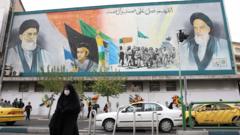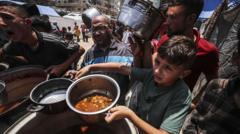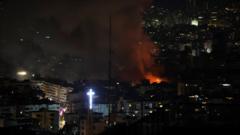The ongoing conflict between Israel and Iran has left Tehran wrestling with crucial choices that pit the desire to respond against the risk of appearing weak. Following a serious of damaging strikes by Israel, Iran's leaders find themselves under pressure to formulate a strategy that safeguards the regime's interests while maintaining regional standing.
Iran's Dilemma: Escalation or Retreat Amidst Increasing Tensions with Israel

Iran's Dilemma: Escalation or Retreat Amidst Increasing Tensions with Israel
As Israel intensifies its military actions against Iran, the Islamic Republic grapples with pressing decisions that could reshape its geopolitical landscape.
Iran's leaders are under immense pressure as the conflict with Israel escalates, presenting them with a series of high-stakes choices. After a recent wave of Israeli attacks, Iranian Supreme Leader Ayatollah Ali Khamenei and his advisers must navigate a delicate balance between the risks of retaliation and the potential fallout of appearing submissive. With Israeli strikes intensifying and Iran's military capabilities under scrutiny, the stakes are higher than ever for the Islamic regime.
At one extreme, Iran could opt to launch a concerted missile counterattack, a move that could escalate the conflict further, as Israel has already warned of retaliation. Conversely, refraining from military action might project an image of weakness, potentially inviting further aggression not only from Israel but also from the U.S., which continues to back its closest ally in the region.
As tensions mount, Iran’s state-run media has issued defiant statements, indicating a readiness to respond to Israel’s attacks, reflecting a national posture of self-defense. Recently, Foreign Minister Abbas Araghchi laid out Iran's stance, emphasizing that any aggression would meet with a decisive answer, invoking international laws that grant nations the right to self-defense.
Britain's Prime Minister Sir Keir Starmer has echoed calls for restraint amid growing concerns over further regional escalation. He emphasized the need for Iran to avoid retaliation and highlighted Israel’s right to defend itself, framing the urgent need to de-escalate the situation.
However, Iran's prolonged campaign of low-level resistance against Israel poses a significant strategic challenge. While seeking to avoid all-out war, Iran's capability to wage proxy battles through allies such as Hezbollah and the Houthis reflects a formidable tactical approach to counter the Israeli threat. The ongoing conflict has seen dire consequences, including mounting casualties and massive displacement, particularly in Lebanon, as Israel ramps up military operations.
As Israel continues its aggressive tactics, including a recent airstrike that claimed the lives of senior Iranian military officials, the dynamics shift precariously. Notably, the U.S. remains firmly aligned with Israel, bolstering its defenses in the region and making clear its stance on response actions, including through military support.
Amidst this charged atmosphere, Iran faces a crucial juncture as the ramifications of its actions ripple across the geopolitical landscape. Whether to reciprocate with heightened aggression or to seek avenues for negotiation remains a contentious debate among Iranian leaders. The complexities deepen further with upcoming U.S. elections, potentially influencing strategic decisions for both Tehran and Jerusalem.
The current crisis underscores the urgent need for diplomatic efforts to mitigate conflict and avoid spiraling consequences that could engulf the Middle East in greater instability. Iran's leaders must weigh their options carefully, aware that the choices they make could reverberate not just for their regime, but for the global community as well.





















